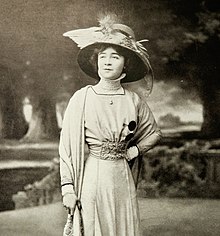music.wikisort.org - Singer
Juliette Clarens (10 April 1887 – 10 October 1978), born Juliette Marie Charlotte Dietz-Monnin, was a French actress, singer, and writer.
Early life
Juliette Marie Charlotte Dietz-Monnin was born in Paris in 1887, the daughter of Jules Dietz-Monnin and Henriette Adrienne Marie Adolphine Hallier.[1] Her father's family, of Alsatian origin,[2] was socially and politically prominent; her grandfather was life senator Charles F. Dietz-Monnin,[3] and her grandmother Adèle is featured in a painting by Edgar Degas.[4][5] Because of their social standing, her choice of a stage career was considered newsworthy. She studied with Comédie-Française actress Thérèse Kolb.[6]
Career
Clarens was a stage actress and singer in Paris before 1920, a colleague to Cécile Sorel Geneviève Vix, and Yvonne Garrick.[7] Like them, she was considered a stylish beauty,[8] and she was often featured in fashion photographs in magazines and on postcards.[9][10] She lectured on fashion trends.[7]
Clarens appeared in dozens of short silent films made between 1910 and 1918; her longer works included appearances in Dette de haine (1915), Scènes de la vie de Bohème (1916), and the twelve-part serial Judex (1916), starring Musidora and René Cresté. Her final film was the seven-part serial Le travail (1920).[11]
Later in life, Clarens was a writer, publicist, and journalist,[12] author of D'avant-hier à aujourd'hui (1962).[13]
Personal life
In 1907, Clarens broke an engagement to marry French writer Francis de Croisset, reportedly to marry a Belgian banker named Lowenstein.[14] She had a daughter, Yvonne Pierre-Mortier, with writer Pierre Mortier.[12] Juliette Clarens died in Paris in 1978, aged 91 years.[1]
References
- "Juliette Clarens (1887-1978)". data.bnf.fr. Retrieved 2020-07-09.
- "News from Paris". Daily News. 1885-12-12. p. 6. Retrieved 2020-07-09 – via Newspapers.com.
- "Charles Frederic Dietz-Monnin Dead". The New York Times. 1896-01-08. ISSN 0362-4331. Retrieved 2020-07-09.
- "Portrait after a Costume Ball (Portrait of Madame Dietz-Monnin)". The Art Institute of Chicago. Retrieved 2020-07-09.
- "Portrait of Madame Dietz-Monnin » Norton Simon Museum". Norton Simon Museum. Retrieved 2020-07-09.
- "Society Girl Goes on Stage; Mlle. Dietz-Monnin Assumes Parts in Self Written Plays". Oakland Tribune. 1909-02-21. p. 47. Retrieved 2020-07-09 – via Newspapers.com.
- "This May Settle the Harem Skirt". St. Louis Post-Dispatch. 1911-04-02. p. 3. Retrieved 2020-07-09 – via Newspapers.com.
- "'Best Dressed Woman in the World' Plans to Conquer Us". St. Louis Post-Dispatch. 1912-02-25. p. 3. Retrieved 2020-07-09 – via Newspapers.com.
- "Our Fashion Department". The Theatre Magazine Advertiser. 15: ix. May 1912.
- Talbot (July 1912). "Mlle. Juliette Clarens". Theatre Magazine. 16: xix.
- Rainey, Buck (2015-06-08). Serials and Series: A World Filmography, 1912-1956. McFarland. pp. 125, 245. ISBN 978-1-4766-0448-0.
- Qui êtes-vous?: Annuaire des comtemporains; notices biographiques (in French). C. Delagrave. 1924. pp. 243, 558.
- Clarens, Juliette (1962). D'avant-hier à aujourd'hui.
- "Broken Engagement Gives Paris Gossip". The Philadelphia Inquirer. 1907-09-01. p. 33. Retrieved 2020-07-09 – via Newspapers.com.
External links
- Juliette Clarens at IMDb
- A 1912 portrait of Juliette Clarens, at Getty Images.
Другой контент может иметь иную лицензию. Перед использованием материалов сайта WikiSort.org внимательно изучите правила лицензирования конкретных элементов наполнения сайта.
WikiSort.org - проект по пересортировке и дополнению контента Википедии
